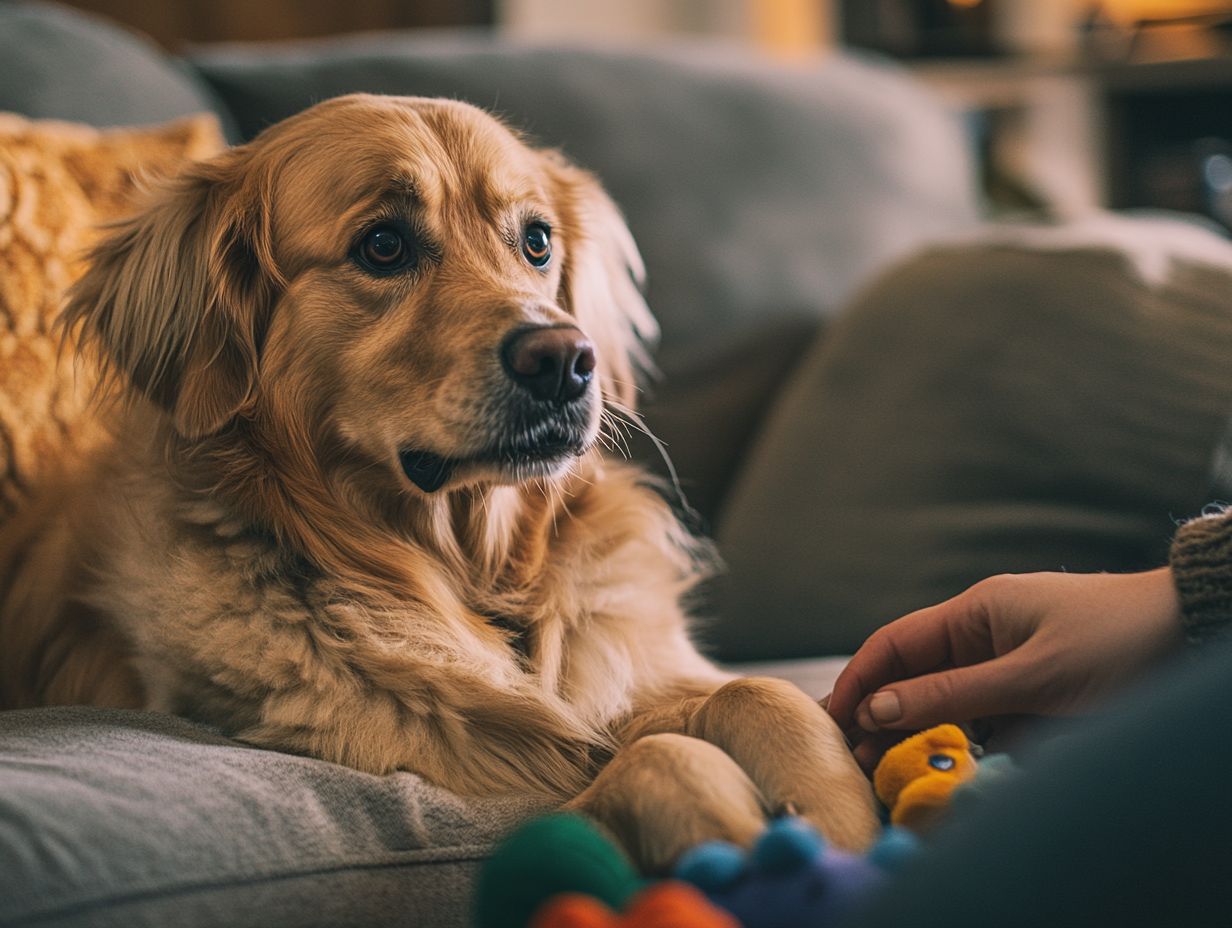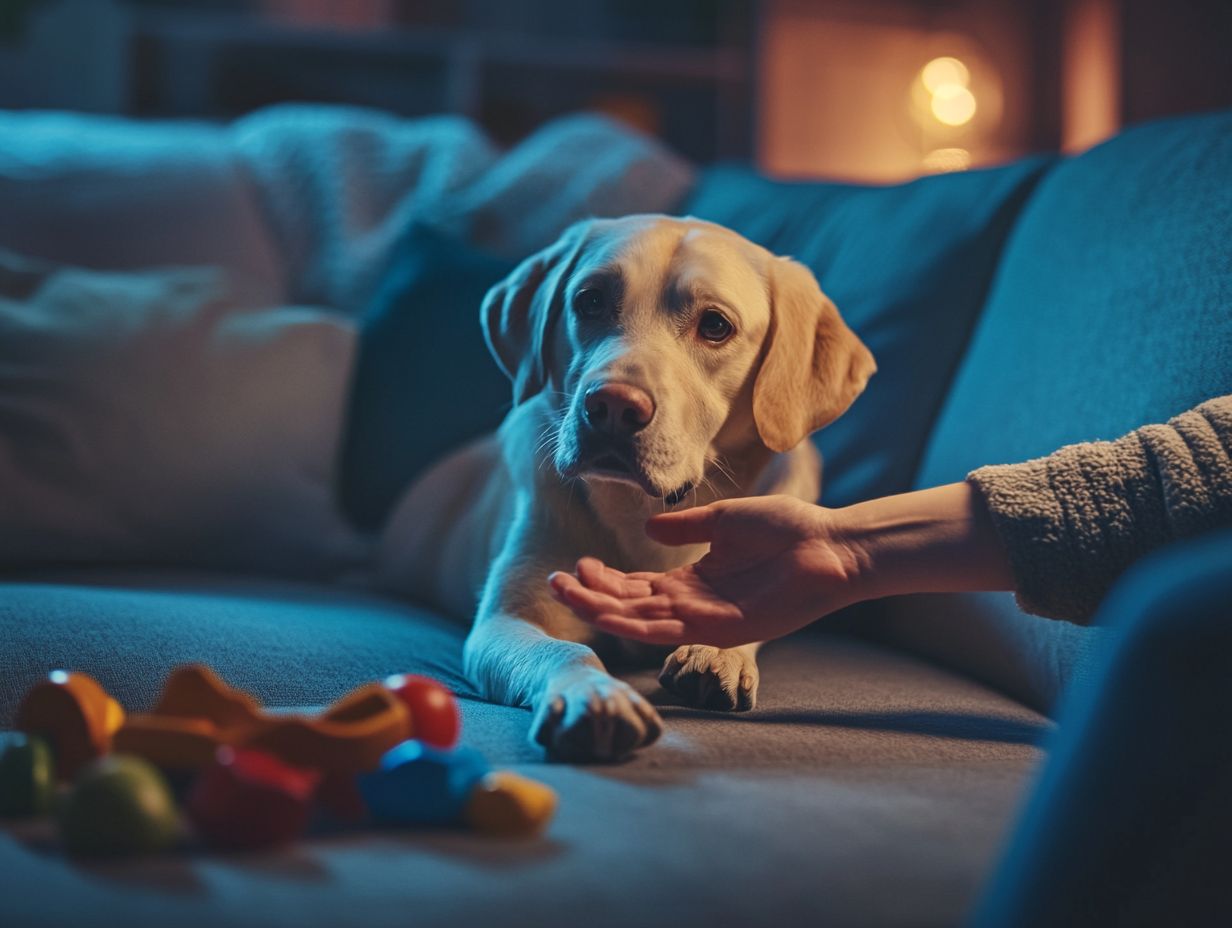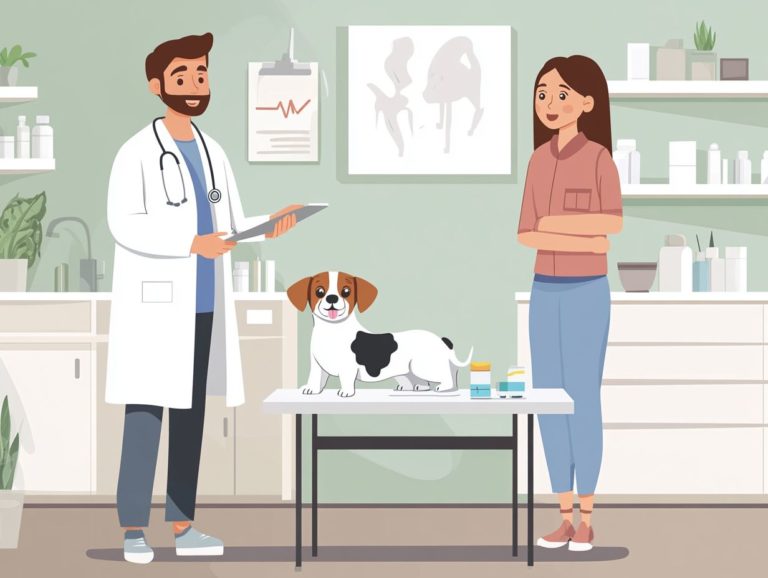Can Anxiety in Pets Lead to Other Issues?
Anxiety in pets is a significant concern for many pet owners. It often reveals itself through distressing behaviors and health complications. Recognizing the common triggers and symptoms is essential in determining whether your furry friend is experiencing anxiety.
This article delves into the potential repercussions of untreated anxiety. It offers effective management strategies and practical tips to cultivate a serene environment for your pet. It also explores the connection between pet anxiety and broader health issues, equipping you with insights to help your cherished companion thrive.
Contents
Key Takeaways:

- Untreated anxiety can lead to serious problems. Pets may become aggressive or destructive, and their overall well-being can decline.
- Effective management and treatment options, like behavior modification and medication, can significantly improve your pet’s anxiety and overall well-being.
- Creating a calm environment, with plenty of mental stimulation and socialization opportunities such as trips to dog parks, can help prevent anxiety and its potential link to other health issues.
Anxiety in Pets: Causes and Symptoms
Anxiety in pets, especially in dogs, is becoming a pressing concern for both pet owners and veterinarians. Issues like separation anxiety and fear-related anxiety can significantly affect their quality of life. Moreover, pet anxiety can affect other pets in the home, making it essential to understand the root causes and symptoms for timely intervention and effective treatment.
Resources like the Merck Veterinary Manual and the AKC (akc.org) offer invaluable insights into recognizing anxiety symptoms. These symptoms may display as behavioral changes, increased aggression, or even destructive behavior.
By familiarizing yourself with these signs and their potential impact on your dog’s mental health, you can provide better support for your furry companion.
Common Triggers and Signs to Look Out For
Identifying common triggers and signs of anxiety in your pets is crucial for effective intervention. Many dogs may struggle with separation anxiety, fear-related anxiety, or other disorders stemming from environmental factors or changes in routine, raising the question of whether pet anxiety is becoming more common.
These triggers can vary widely ranging from sudden loud noises like thunderstorms or fireworks to significant changes in your daily schedule. A new environment or the introduction of unfamiliar people or pets can also heighten anxiety levels.
As a pet owner, you should be attuned to symptoms such as excessive barking, trembling, or hiding. These signal distress in your canine companions. By understanding canine body language, you can better recognize these signs and adapt your training strategies to address specific anxiety triggers, ultimately ensuring a happier and more secure pet.
Potential Consequences of Untreated Anxiety
Untreated anxiety can lead to serious problems. Pets may become aggressive or destructive, and their overall well-being can decline. If you’re wondering can pet anxiety be cured, don’t wait! Seek the help of a veterinary behaviorist right away.
Physical and Behavioral Effects

The physical and behavioral effects of anxiety in your pets can be quite profound. You might notice destructive behavior, changes in appetite, or even more serious conditions like cognitive dysfunction syndrome, a condition that affects how your dog thinks and behaves as they age. It’s important to understand if anxiety in pets is a behavioral issue to address these signs effectively.
These signs can also manifest as noticeable weight loss, lethargy, or an increase in fatigue, clearly indicating that your pet is grappling with emotional distress. Look for behavioral cues such as excessive barking, hiding, or becoming overly clingy; these are all signals that your pet is feeling heightened stress.
To help alleviate these anxiety symptoms, you can explore several effective treatment options, such as anxiety treatment plans tailored to your pet’s needs.
- Playing calming music, which has been shown to soothe many anxious animals.
- Consulting a veterinarian about medication specifically designed for anxiety could lead to significant improvements in your pet’s overall well-being.
If you notice any signs of anxiety in your pet, contact your veterinarian today to discuss the best treatment options.
How to Help Your Anxious Pet
Helping an anxious pet requires a comprehensive strategy that includes various treatment techniques. You can consider incorporating dog training, teaching your pet to feel safe in fear-inducing situations, and desensitization into your approach.
You can also explore anxiety medications like fluoxetine or benzodiazepine. Innovative products like CBD oil from Innovet products can further support your pet’s well-being.
Effective Management and Treatment Options
Managing your pet’s anxiety can drastically improve their happiness and health! By using dog training, desensitization techniques, and, when necessary, anxiety medications, you create a more stable environment for your furry friend.
Many pet owners find that incorporating CBD oil into their treatment regimen is beneficial as a natural alternative. Engaging your pet in regular socialization activities is essential; it helps reduce anxiety by exposing them to new environments and interactions.
Training techniques focused on positive reinforcement can build your pet s confidence and foster a sense of security. By blending these strategies, you can create an effective approach that addresses your beloved companion’s emotional well-being.
Preventing Anxiety in Pets
Preventing anxiety in pets begins in puppyhood, where early socialization and obedience training play crucial roles. To better understand how to support your furry friend, it’s important to recognize the signs of chronic anxiety in pets. Providing mental stimulation and a serene environment can benefit them significantly.
Incorporating calming music and structured playtime into their routine fosters a sense of security and well-being.
Tips for Promoting a Calm and Stress-Free Environment

Creating a calm and stress-free environment for your pet is easier than you might think. It starts with a few simple yet effective strategies. Consider incorporating calming music into their daily routine; soothing melodies can significantly reduce anxiety levels and create a tranquil atmosphere.
Thoughtful crate training can also provide your pet with a safe haven when they feel overwhelmed. Make sure the crate is an inviting space a cozy den, not a place of punishment.
Additionally, integrating regular socialization opportunities, such as playdates with other dogs or group training classes, can boost their confidence and help reduce stress triggers in various settings. With these strategies, you can cultivate a tranquil environment that supports your pet s well-being.
Understanding the Link to Other Health Issues
Understanding the connection between anxiety in pets and health concerns such as cognitive dysfunction and anxiety disorders is essential for pet owners. Many wonder, is it normal for pets to have anxiety? This highlights the importance of seeking expert guidance from a veterinary behaviorist to ensure your pet’s holistic well-being is addressed.
Exploring the Connection and Possible Solutions
Exploring the link between anxiety disorders and conditions like cognitive dysfunction syndrome in pets offers important insights into their health and raises the question of can pet anxiety affect their relationship with me? It emphasizes the need for timely anxiety treatment and professional intervention from a veterinary behaviorist.
Understanding this relationship is crucial, as untreated anxiety can worsen cognitive issues, leading to a decline in overall well-being. Recognizing that symptoms often linked to anxiety, such as excessive barking, destructive behavior, or withdrawal, can complicate existing cognitive dysfunction is essential. For more insights, check out how anxiety affects a pet’s daily life, creating a detrimental cycle for your furry companion.
Consulting a qualified professional is vital, as they can develop tailored treatment plans that may include:
- Behavioral modification techniques
- Environmental adjustments
- Appropriate medication
These strategies aim to alleviate anxiety and enhance cognitive function, ultimately improving your pet s quality of life and reducing the risk of cognitive dysfunction syndrome.
Frequently Asked Questions
Here are some common questions pet owners have about managing anxiety in their pets.
Can Anxiety in Pets Lead to Other Issues?

Pet anxiety is more common than you might think! Understanding its effects can help keep your furry friend happy and healthy.
Yes, anxiety in pets can lead to various physical and behavioral issues if left untreated.
What are some physical issues that can arise from anxiety in pets?
Anxiety can cause stomach issues, skin irritations, and a weakened immune system.
Can anxiety in pets lead to aggression?
Yes, anxiety may cause aggression, especially towards other animals or unfamiliar people.
How can I tell if my pet is experiencing anxiety?
Signs of anxiety include excessive barking or meowing, destructive behavior, and loss of appetite.
What can I do to help my pet with anxiety?
Start by consulting a veterinarian to determine the best way to help your pet manage anxiety. This may include medication, behavioral therapy, or lifestyle changes.
Is anxiety in pets a common issue?
Absolutely! Anxiety affects pets of all ages and breeds, and it s vital to address it promptly.






